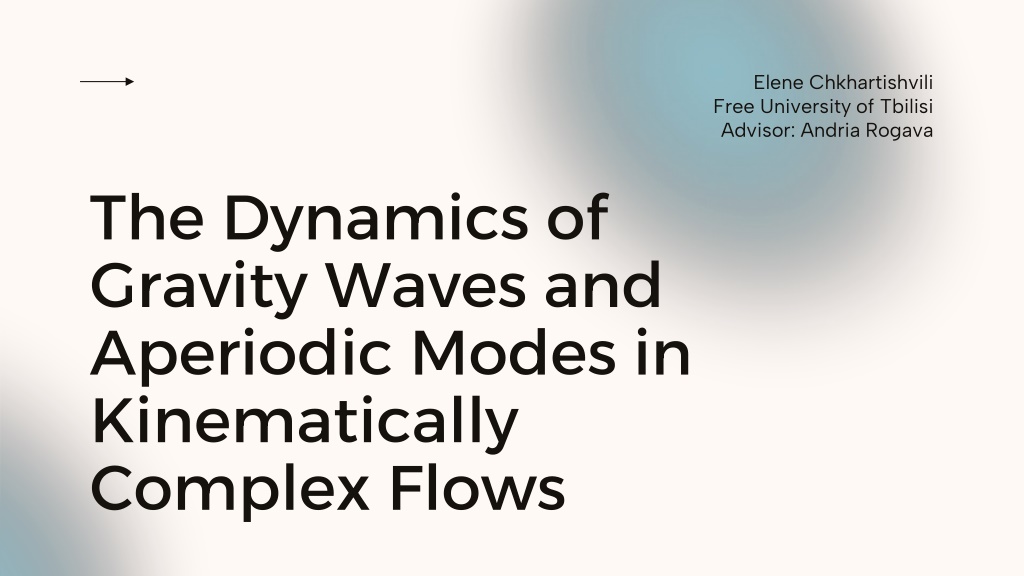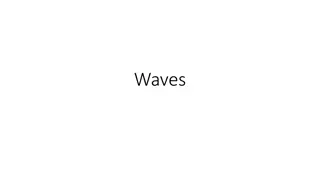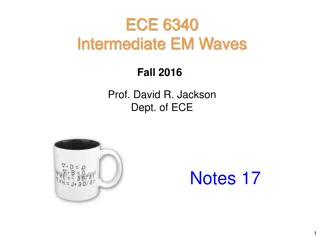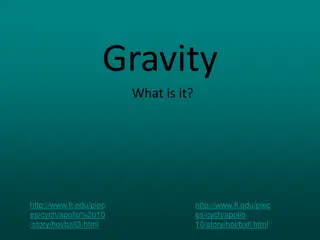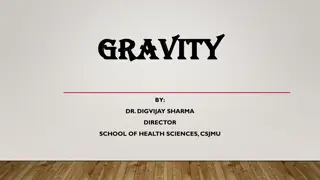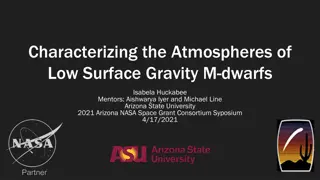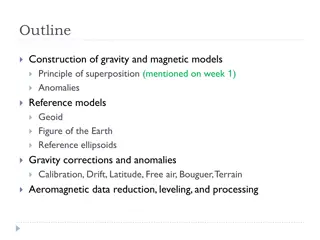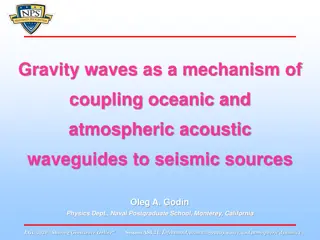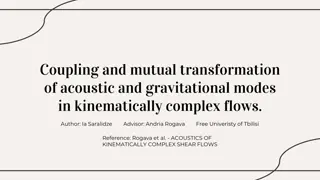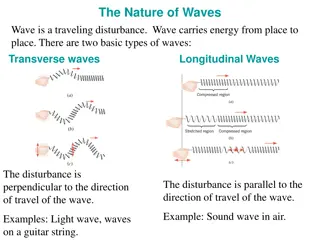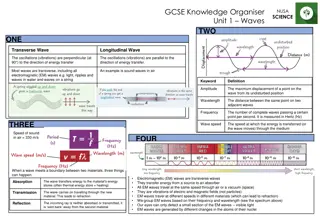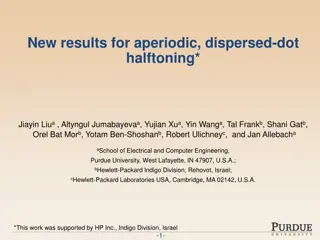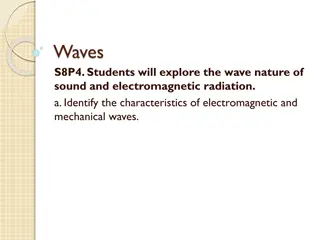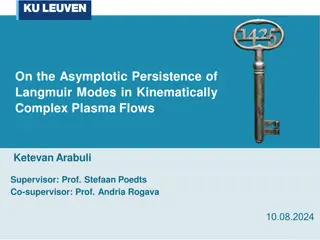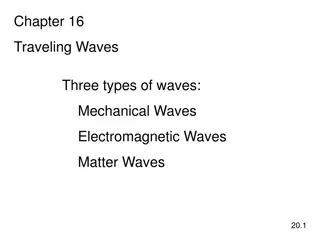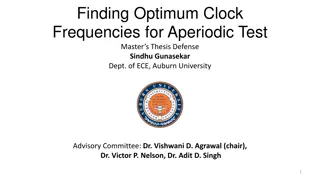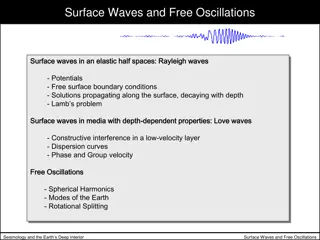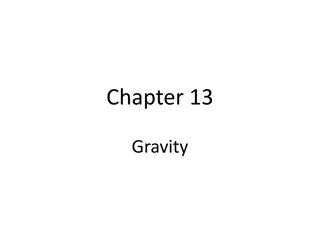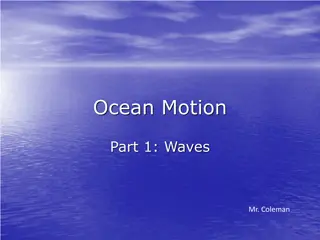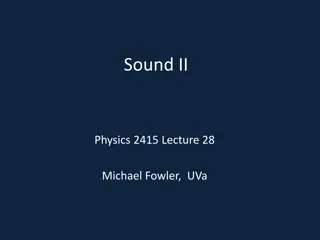Exploring Gravity Waves and Aperiodic Modes in Kinematically Complex Flows
Delve into the dynamics of gravity waves and aperiodic modes in kinematically complex flows in this detailed study by Elene Chkhartishvili from Free University of Tbilisi. The research covers topics like internal gravity waves, main formalism, linearization of the velocity field, main equations, and insights into the incompressible case. Discover the phenomena, calculations, findings, and future perspectives related to gravity waves and their behavior in nature.
Download Presentation

Please find below an Image/Link to download the presentation.
The content on the website is provided AS IS for your information and personal use only. It may not be sold, licensed, or shared on other websites without obtaining consent from the author. Download presentation by click this link. If you encounter any issues during the download, it is possible that the publisher has removed the file from their server.
E N D
Presentation Transcript
Elene Chkhartishvili Free University of Tbilisi Advisor: Andria Rogava The Dynamics of Gravity Waves and Aperiodic Modes in Kinematically Complex Flows
Table of Contents 01 The Phenomenon 03 Calculations and Findings 02 Main Formalism 04 Future Perspectives
Internal and surface gravity waves, simulation 01 The Phenomenon
What Are Gravity Waves ? Internal gravity waves occur in density stratified fluids in the presence of a gravitational field. They arise as gravitational restoring forces act on vertically displaced fluid.
Main theory and formalism 02 Main Formalism
Main Theory Background Velocity Field ? ?,?,? = ???,?,? ??+ ???,?,? ??+ ???,?,? ?? Shear Matrix ??,? ??,? ??,? ??,? ??,? ??,? ??,? ??,? ??,? ?11 ?21 ?31 ?12 ?22 ?32 ?13 ?23 ?33 ?
Linearization of The Velocity Field ???,?,? ??(?0,?0,?0) + ????? Spatially Inhomogenous Operator ? ??+ ??(?,?,?)?? Eliminating The Spatial Dependency ? ?,?,?;? ? ? ? ,? ??? ?? = ????? ? ? ??? ?? ?0? ??? ??
Main equations and the incompressible case 03 Calculations and Findings
Main Equations ?? The transposed Shear Matrix ? Time-Dependent Wavenumber Vector ??? + ?? ? = 0 ? ?2 ?1 ? Working Shear Matrix ? = (1)= ??? ?2?? (1)= ?1??+ ??? ?? ?? ?? Equations For The Wavenumber Vector Components (1)= 0
Equations for the Incompressible Case Equations for the Velocity Vector Components ? Dimensionless Notation of the Pressure Perturbations ? Frequency (1)= ??? ?1?? ??? ?? Other Important Equations (1)= ?2??+ ??? ??? ?? ????+ ????+ ????= 0 (1)= ??? + ??? ?? (1)?? ???? 1= ????? = ?? ?(1)= ?? ???? ???? ? = ??2 ?? ????+ ????
Findings and Derivations 2 2 2 2ln ? ?2 2 2 (2) ?? 1+ ?2? ?2+2 ?1 ?2?? = ?2 ? ? 2 ?2 ?2? Eliminating the First Order Differential Term 2 1 2 ? ?2 2??2 2 ?2 ??4 2?2 ??2 2? (3? 2?2 2 3 2) = ?2 ? ? (2)+ + 2 ? ? 2; ?2= ? 2; 2= ?2+ ?1?2; ? = ?????. 2= ?? 2+ ?? 2+ ?? ? ???: ?
Eliminating the First Order Differential Term (2)+ ? ? 1+ ? ? = ? ? = ? After differentiating and plugging into the initial equation: ? (2)+ 2?1+ ?? 1+ ?? + ??1+ ?2 = ? So, if we choose 2?1= ??, then the first order derivative will vanish, and we will be left with the equation: (2)+ ? + ??1 ?+?2 ? ?. = ? 2 2 ??2ln ? 2?2 In our case, ?(1) . ?= 2 ? ?2, which we can plug into the equation to finish the elimination process. From this, ? =
04 Future Perspectives
Future Perspectives Numerical Computations Natural Phenomena Helioseismology
Do you have any questions? Elene Chkhartishvili Free University of Tbilisi Advisor: Andria Rogava CREDITS: This presentation template was Flaticon created by Slidesgo, and includes icons by Flaticon and infographics & images by Freepik Slidesgo Freepik Thank you !!
